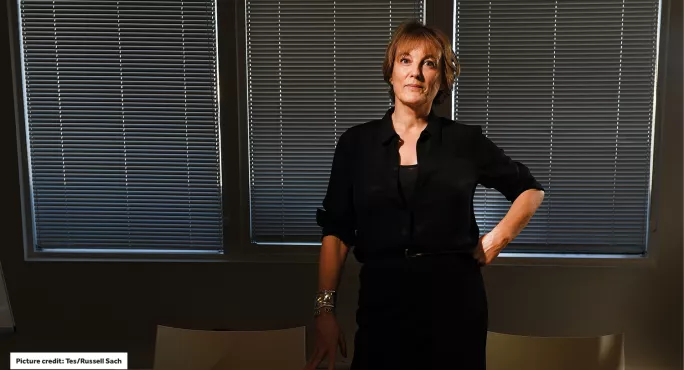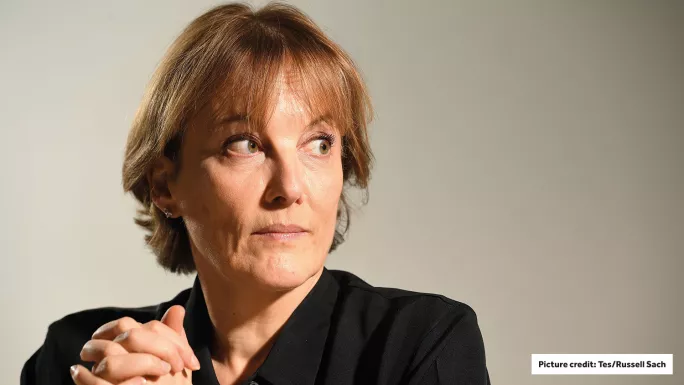- Home
- Profile: ‘The school I went to failed lots of children, and schools continue to fail children’
Profile: ‘The school I went to failed lots of children, and schools continue to fail children’

This profile was first published in Tes magazine on 9 June 2017
Lucy Heller does not talk about her own schooling in glowing terms.
“I had a not-great education at a comprehensive school,” the chief executive of Ark - the education charity and academy chain - says, reflecting on what gets her into work each morning.
“But I was fine,” she continues. “I’m middle-class - I had the kind of parents who would see me through it.”
As the daughter of a screenwriter father and entrepreneur mother, for Heller, her apparently mediocre schooling did not determine her future in the way that it might have done for some of her classmates.
In this respect, her personal experience chimes with Ark’s credo - through offering a quality education, the goal of the charity has always been to ensure that all children, regardless of their background, have access to genuine life choices.
“The school I went to failed lots of children, and schools continue to fail children,” Heller says. “While that happens, of course, we want to carry on and make a difference.”
But beyond this brief reference to her schooling, she has little time for public introspection.
Prior to our interview, an Ark press officer offers Tes a word to the wise - Heller is never one to enjoy talking about herself.
It’s sound advice. Tes asks her to reflect on her own career at Ark, which she joined in 2004 before taking over as chief executive in 2012. Heller says “it’s been fantastic” to have grown the organisation - but quickly moves the conversation on.
Fortunately, she’s much happier to talk about Ark and education policy. And as someone who was in the vanguard of the academy revolution, she has been at the centre of developments in the schools system over the past decade.
Beyond expectations
Heller says it has “changed out of all recognition” since Ark took over its first school, Burlington Danes - a West London comprehensive - in 2006.
In that year there were 46 academies in operation. Today, Ark alone has 35 in its network, and there are now more than 6,000 academies nationwide.
“When we started...it was with the expectation that [academisation] was addressing the problems of the 200 worst-performing schools in the country,” she remembers.
“I don’t think anybody expected that the majority of secondary schools would be academies and that the mass academisation would happen.”

As one of the most high-profile multi-academy trusts (MATs), it’s sometimes easy to forget that Ark does more than just run schools.
The charity has acted as an incubator for a range of education projects, from the East Asian-inspired Mathematics Mastery programme to Now Teach - a new scheme that aims to get late-career city professionals into teaching.
Heller admits there’s a risk that these bright ideas could distract Ark’s schools from their “core business” of giving pupils a good education, but she says the ventures are quickly “spun off” into separate teams to guard against this possibility.
In any case, they don’t appear to have done Ark any harm to date, with the chain regularly identified as one of the strongest MATs. It was cited by the Department for Education as one of the highest performing academy chains in terms of its 2016 key stage 4 results, and was also singled out for praise by Ofsted.
There’s no special secret to this, she insists - it’s the result of focusing on the “craft of teaching” and having “high expectations” of students from disadvantaged backgrounds. Crucially, she says, “really meaning high expectations is a different thing from saying it”.
Some people, such as Sir Michael Wilshaw, the former Ofsted chief inspector, have been highly critical of a cohort of underperforming MATs, but Heller appears reluctant to condemn her peers.
She says that when the number of academies exploded, the Department for Education initially found it “problematic” holding them all to account, but “capacity is being built” slowly.
The other advantage Ark had over later MATs is that it started out in a “golden age of academy funding”, Heller points out.
“There was a bit of room and, actually, you had the funding that allowed you to do the school improvement work. It’s much tougher now.”
Heller says that Ark’s financial benchmarking shows it is currently in a “relatively strong position” compared with other MATs - although she only takes “cold comfort” from this fact.
“You’ve got an organisation that is 70-80 per cent based on staff costs, and you’re also trying to drive better outcomes. So to stop and try and reshape and change things is really difficult.
“I don’t think that our education has suffered yet but I do think that it’s very tough, looking forward over the five-year period.”
Unfortunately for Heller, leaner funding may not be the only unwelcome development she has to deal with. The Conservatives’ ambition to roll out new grammar schools poses a challenge to Ark’s commitment to providing a mixed-ability education.
Some MAT chief executives have indicated a willingness to explore introducing selection to their networks. For example, Sir Daniel Moynihan, the Harris Federation boss, has said he might be forced to open grammars to stop the chain’s best pupils being creamed off by rival selective schools.
But Heller strikes a more defiant tone. “If you want to get a measure of a society, it’s not, in a way, what it does for the brightest, for the most able - it’s how it treats its most disadvantaged,” she says.
She insists Ark will hold the line against academic selection - including the “grammar streams” that some academies have employed to separately teach their ablest pupils.
“The schools that we run now, mixed schools for all students, are where we can deliver great education,” she says. “So no, I don’t think that we will go down the grammar route.”
Tackling the gender gap
With MATs now the dominant schools model, their leaders have become major figures in the education world. This has brought a new level of scrutiny to Heller and her peers - and particularly their pay packets.
Heller had a total pay and benefits package of £205,630 in 2016, less than half that received by Moynihan, the highest-paid academy boss. But she says that she is “relatively relaxed” about how much her peers are earning - so long as they’re performing.
“The only thing that seems to me inexcusable is to be taking large amounts of money out of the system if you’re not delivering great results,” she says.
What she is concerned by is the fact that only a minority of MAT chief executives are women. “Of course we need to do more,” she responds emphatically, when asked if measures need to be taken to improve the gender balance.
Heller believes the that current male dominance may be due to “unconscious bias” in the hiring process. However, she suspects her own partiality tugs in the opposite direction.
“I think, obviously, that I am very clearly just trying to get the best people - and I have ended up with a heavily female staff,” she smiles.
“We have got a high proportion of women as principals, as leaders in the schools and in the central team...I suspect that is my unconscious bias.”
As for what’s next for Ark, Heller says that it has much more work to do in creating a network of “excellent” and “sustainable” schools, and having an impact beyond its footprint via its spin-offs.
“It’s mountains beyond mountains,” she says. “You have that thing where you reach the top of the mountain, you think you’ve got great results, and then the peak rises beyond that.”
Does the passion for her job burn as brightly as it did 13 years ago?
“If anything, more,” she replies. “You have more sense that we’ve made some kind of a start on things, but also you have the greater sense of how much there still is to do.”
Want to keep up with the latest education news and opinion? Follow Tes on Twitter and Instagram, and like Tes on Facebook
Keep reading for just £1 per month
You've reached your limit of free articles this month. Subscribe for £1 per month for three months and get:
- Unlimited access to all Tes magazine content
- Exclusive subscriber-only stories
- Award-winning email newsletters



